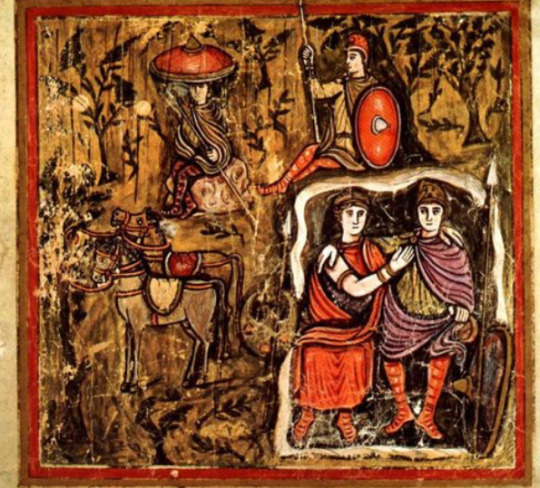#classical latin
Text
The Seventh Day of Julius Caesar
Julius Caesar did not speak in Ecclesiastical Latin (also known as Italianate Latin).
This is a misconception close to my heart because I actually got banned from TikTok because of it!
Basically, I was scrolling through the comment section of a TikTok video when I saw someone wrote a comment saying that Classical Latin pronunciation is artificial and fake and that Ecclesiastical Latin is actually the real, natural pronunciation of Latin that every single ancient Roman spoke in.
I replied to them, saying no, Ecclesiastical Latin is the artificial one, because it is pronouncing Latin with modern Standard Italian phonology. Languages evolve and there is no reason why every single Latin-speaking ancient Roman should have pronounced it as if it was Standard Italian. Latin was a living language for a long time and was spoken in a very large area, of course there would be tons of accents and dialects, changing and evolving over hundreds of years, and none of them should be identical to Ecclesiastical Latin, which is based on a modern language.
When linguists use clues to get a good idea of how educated people in Rome spoke Latin around the time of Julius Caesar, it's called Classical Latin pronunciation. It's not artificial; it's our best guess. And we have a lot of clues!
By the way, it's so annoying to write anything intelligent on TikTok because the character limit on comments is so restrictive!
What happened next was an insane back and forth argument that took place over 5 hours, and I now realise that I should've never interacted with them in the first place because nothing good would've come out from that.
It was a very amusing but very frustrating argument. My favourite part was when they kept saying I should read Vox Latina by Sydney Allen, which by the way, I had already read. They must've bought their copy of the book from the Dollar Store because I do not know how they read the book and believed that the ancient Romans spoke Ecclesiastical Latin. The entire book is pretty much about how the ancient Romans did not speak Ecclesiastical Latin! The Classical Latin pronunciation that person hates so much is exactly what Sydney Allen wrote in support of in Vox Latina!
Though I wish less people treated Vox Latina like the gospel. It's great but pretty old and outdated. I especially disagree with what he said about the vowels.
Anyway, one very long very amusing very frustrating argument later, they reported me for being underage, which I'm not. Proving I wasn't underage was too obnoxious for me, so I just quit using TikTok. The End.
I'm so sorry for anyone who isn't interested in the pronunciation of Latin; this must be so boring for you. But what I'm trying to get at is that we have a pretty good idea of how Julius Caesar would've pronounced Latin, and it's not Ecclesiastical Latin.
For example, veni vidi vici in Ecclesiastical Latin is pronounced similar to veh-nee vee-dee vee-chee (oh I hate writing things out phonetically like that but the IPA isn't working for me for some reason). But it most likely would've been pronounced similar to weh-nee wee-dee wee-kee (except the e in veni is pronounced a little bit more closed than in Ecclesiastical Latin).
#the 15 days of julius caesar#julius caesar#ides of march#ancient rome#latin#latin language#ecclesiastical latin#classical latin
67 notes
·
View notes
Text
never get me talking about latin pronunciations i *will* start rambling about the differences between ecclesiastical and classical latin because i’m pretty knowledgeable on the subject just by way of having both taken latin and having sung multiple pieces in latin
#latin language#linguistics#ecclesiastical latin#classical latin#choral music#repost because i forgot tags
94 notes
·
View notes
Text
these pictures are awful but i just made a loaf of panis quadratus and i’m so excited


#original post#sorry i’m a classics major#latin#classics#classical latin#ancient rome#rome#pompeii#herculaneum#bread#sourdough#recipe#baking#dark academia
43 notes
·
View notes
Text
I love how, whether intentionally or not, some aspects of DMC Vergil are reminiscent of the poet Vergil. Vergil is “the storm that is approaching.” In the Aeneid, storms are an important plot device. In both book 1 and 4, there’s the idea of the “magno misceri murmure,” the sea/sky starting “to mix with a great roar” in what is obviously a storm. These storms precede important events, namely Neptune’s rebuke of the winds and Aeneas and Dido entering the cave. Moreover, as Urizen Vergil’s goal is to feed the Qlippoth Tree human blood to produce an apple, essentially acting as a sort of grim farmer. The poet Vergil wrote the Georgics, a sort of ode to farming. It’s fitting, then, that the character sharing his name also embodies these elements of his works.
#all DMC Vergil needs now is BEES#latin language#classics#vergil#vergil dmc#dmc5#Georgics#vergil’s aeneid#the aeneid#bury the light#ancient rome#roman literature#roman poetry#classical latin#classical languages
21 notes
·
View notes
Text

Carissima 🥺 *sigh*
24 notes
·
View notes
Text
Half of the Latin memes I see are all: "Linguam Latinam amo! Virgilius meas uwus tenet!
The other half: I HATE latin!!! It is is the WORST!!!! If I see Virgil, it's on SIGHT!!!!!
#latin memes#i would maka uwu accurate to latin#but eh#dark academia#gothic academia#darkest academia#chaotic academia#academia#vampire academia#light academia#goth#gothic#victorian gothic#latin student#classics#classical latin#latina lingua
23 notes
·
View notes
Text
To everyone doing Latin on Duolingo, PLEASE SAVE YOURSELVES AND STOP. it's a really bad and often incorrect course. I highly recommend using literally any other resource.
30 notes
·
View notes
Text
Everyone shut up for a second!
My library offers the Mango language learning program and I’ve tested it so far and it’s so good!! I took Russian one semester and honestly it does so much better than my PAID lessons! (My prof had us look at her Russian Facebook page for 45 minutes each class session).
I’m going to use it to master Russian and to learn/master Farsi. That’s right THEY OFFER FARSI! (Yay poto!)
Along with a myriad of other languages, including classical Latin! 
It’s a lot better than that serial killer language owl thing that gives trivial information, but doesn’t help you understand what you’re saying/why you’re saying it.
So this is a reminder to check your local library’s online language programs and if they don’t have mango try to advocate for it.
#languageblr#mango#library#books & libraries#support libraries#languages#learn a new language#farsi#classical latin#russian
4 notes
·
View notes
Text
🌿🏺If you have a blog about ancient Rome please like/reblog this post so I can find you and follow you easier. I need some ancient content to fuel myself with. 🏺🌿
#ancient rome#rome#ancient greece#ancient stuff#ancient history#latin#classical latin#ancient literature#oddysey#illiad
10 notes
·
View notes
Text
Latin is so beautiful.
#random thoughts#classical latin#latin#dark acadamia#light academia#chaotic acadamia#dark acadamia aesthetic#motivation
11 notes
·
View notes
Text
Listen to this artist, thank me later!!!!!! I desperately want this artist to become popular!!!
#attic greek#classical latin#old norse#old english#pagan#hellenic#helpol#witchblr#music#witchy music#ancient music#muses#Euterpe#apollo#ancient greece#witch music#pagan music#Spotify
38 notes
·
View notes
Text
Some words in Ecclesiastical pronunciation sound like sneezes! Accio. Terentius. Heeheehee it's so cute but I can't take it seriously!
#honestly the reason i prefer classical pronunciation is because i dont want to give power to the church#dont get me wrong#classical pronunciation is cute and sexy and beautiful#but so is ecclesiastical#i like classical because its more academic and less catholic#but if my choice had to be which one sounds better#i dont know i like them both!#theyre beautiful in their own ways!#latin language#lingua latina#classical latin#ecclesiastical latin
8 notes
·
View notes
Text
i’m all about being a classics major and learning latin and greek until it’s 11:45 on a friday night and i’m writing paradigms for verbs…
#original post#sorry i’m a classics major#aesthetic#dark academia#dark academia aesthetic#classics#ancient greek#classical greek#latin#classical latin#university#college#classics major
11 notes
·
View notes
Text

Obsessed with how the little shield man near the upper left corner is sitting.
Image is titled “Dido and Aeneas in the Cave,” it’s from the 5th century manuscript Vergilius Romanus.
#bro looks so comfy#I should buy a shield#shield#Aeneas#Aeneas and dido#vergil’s aeneid#the aeneid#vergil#dido#latin language#classical latin#classics#classical art#medieval art#illumination#folio#shieldbrella#good vibes#mood#current mood#ancient rome#rome#roman literature#roman empire#manuscript
10 notes
·
View notes
Text
So a while ago, out of pure boredom, I picked up my latin grammar and syntax books and tried to translate "We become perfect through study", because I really like studying and it's a sentence I use to brand works I've finished reading/writing.
Whether it is correct or not, I've no idea, but I ended up with "Per Studia Perfecta Fimus" (I'm sure there's a better way to phrase it).
Funnily enough, I have a hard time actually studying (blame the adhd and ptsd, I suppose), but that little sentence (branded on my texts, on my door, basically anywhere I can see it regularly), boosts me too continue learning as much as I can, not for grades or outside validation, but because I do like it!!!
It reminds me of it, when I feel like I don't have the energy, and I thought I'd share it. It's not even an affirmation, just a little sentence (which otherwise could have been a quote from a book or other media, a reminder of a moment I enjoyed studying, etc). And it boosts my morale.
So if you ever feel like something you enjoy is becoming a chore (in my case, learning), remember: Per Studia Perfecta Fimus.
#dark academia#mental health#adhd#studying#writing#writers#books#literature#classical latin#books and literature#random thoughts#cheerful#academia#student#ptsd
3 notes
·
View notes
Text
Me Then: LaTiN hAs SiX dIfFeReNt TeNsEs!
Me Then: I'm so confused
Me Now: Latin has specific aspects within the past, present, and future tenses to specify when it is in relation to the topic. This increases the understanding of when in the story something is happening and how it impacts whatever is acting or being acted upon.
15 notes
·
View notes